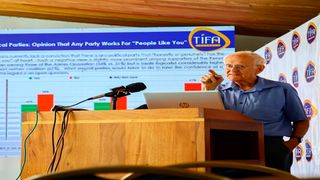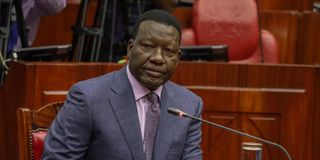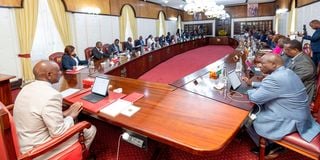
Tifa political analyst Tom Wolf during the release of the findings of the opinion poll at Heron Portico Hotel in Nairobi yesterday.
| Wilfred Nyangaresi | Nation Media GroupNews
Premium
Kenya Kwanza supporters unhappy with state of affairs, Tifa poll shows
What you need to know:
- In the poll, Energy CS Chirchir was rated the worst performing CS
- President Ruto backers believe the new administration has failed to tackle the high cost of living, create jobs and fight corruption
- The ‘hustlers’ who President Ruto and his deputy Rigathi Gachagua rode on to win the August 9 election, have painted a grim view of the government.
Kenya Kwanza supporters are the most disillusioned with the state of affairs in the country, a new poll has shown.
In the survey by Tifa Research released on Wednesday, December 13, supporters of President William Ruto’s administration are more disappointed with the performance of the government since it came into power last September.
The survey, which rated President Ruto’s government in 16 key policy areas, showed that the Kenya Kwanza supporters believe the regime has performed poorly in tackling the cost of living, creating jobs and fighting corruption.
Interestingly, reducing the cost of living was a major part of Kenya Kwanza’s successful 2022 election campaign.
However, the ‘hustlers’ who President Ruto and his deputy Rigathi Gachagua rode on to defeat Azimio leader Raila Odinga in the August 9 election, have painted a grim view of the government.
Overall, a majority of Kenyans at 84 per cent, believe that the current economic conditions have worsened compared to a year ago with the runaway cost of living being cited as a nightmare by many.
This has seen 87 per cent of Kenyans reduce personal expenditure due to the soaring cost of living, with transport, clothing and entertainment taking the hit as they try to survive the crisis.
The survey was conducted between November 25 and December 7, 2023 with 3,009 respondents with a margin of error of +/- 1.79 per cent. The interviews were conducted in Kiswahili and English through telephone interviews.
In order to track the conditions Kenyans have experienced over time and their opinions on certain issues, Tifa said some questions included in previous surveys were repeated on this occasion, while others related to the specifics of the current situation were asked for the first time.
Debt repayments
According to the survey, more Kenya Kwanza supporters than Opposition backers, 42 per cent against 39 per cent, respectively, believe that tackling the rising cost of living and inflation is a challenge the current regime is yet to deal with.
The supporters also raised the declining value of the shilling, corruption and the burden of debt repayment as some of the other challenges the government is grappling with.
Kenya Kwanza leaders have continued to blame the debt repayment challenge on the previous government, which threw its weight behind Mr Odinga in the 2022 elections.
“Given the fact that reducing the cost of living was such a major part of Kenya Kwanza’s successful 2022 election campaign, its continued rise helps to explain why more Kenyans cited it as the main challenge the government currently faces (39 per cent),” said Dr Tom Wolf, Tifa’s lead research analyst.

Cabinet Secretary Davis Chirchir.
The Kenya Kwanza supporters also hold a negative view of their party, saying they lack conviction there is any political party that “honestly or genuinely” has the interests of “the people” at heart.
According to the survey, 54 per cent of government supporters hold such a view against 51 per cent of Azimio.
According to Mr Wolf, a vast majority of Kenyans have experienced considerable economic distress recently, with a large majority across the political divide describing their economic condition as worse than a year ago.
He said that one key indicator of such economic distress is the large majority who say they have had to reduce their personal expenditure, with a vast majority of the respondents identifying food as the main expenditure category that they have chosen (or had to) cut back on.
“Whether such reduced food consumption is having any effect on people’s health is unclear. In similar fashion, the most commonly cited challenge facing the government is inflation/the cost of living,” he said.
Nonetheless, during Tuesday’s Jamhuri Day celebrations, President Ruto defended his economic policies which he said have started to pay off moving Kenya from the edge of debt distress.
Painful decisions
The President said the painful decisions his administration made since assuming office last year have pulled the country “from the brink of debt distress” despite outcry by Kenyans over tax hikes and the soaring cost of living.
He cited policy measures to raise revenue, cutting back on unnecessary expenditure, and deferring implementation of critical developments as some of the painful decisions his administration has had to make to set Kenya on the path of economic renaissance.
Defending some of the measures like tax hikes and removal of subsidies instituted by his administration, which have drawn criticism from the Opposition and a majority of Kenyans, the Head of State said they were necessary.
However, the report showed that nine out of 10 Kenyans have reduced personal spending due to the cost of living.
They have reduced spending on transportation by 15 per cent, clothing by 9 per cent and entertainment by 8 per cent.
The report also found that the monthly income categories of Kenyans showed only slight differences, with the more affluent (earning over Sh20,000 per month) experiencing a slightly lower impact.
“If the sample had included a statistically significant proportion earning much more, say over Sh100,000, this contrast would likely have been even more pronounced,” the poll said.

President William Ruto chairs a past Cabinet meeting at State House in Nairobi.
The researchers also found that while a slim majority of Kenyans (59 per cent) buy most of their food from shops and kiosks, urban dwellers are far more likely to do so than those living in rural areas.
Among rural dwellers, however, only about half (49 per cent) rely on their own shambas as their main source of such consumables, presumably providing them with at least some protection from the recent steady rise in the cost of living.
The researchers also found that less than half of those who earn some money (42 per cent) say they are able to regularly save something at the end of each month. However, the researchers found that there is a clear correlation between this ability to save and income, with the lowest income earners (less than Sh5,000) significantly less able to do so than those in the highest income category (over Sh50,000).
This is true regardless of political affiliation.
In terms of geographic distribution, Tifa said, the highest proportion of those who feel they are worse off now reside in the Lower East, Nairobi and Nyanza, accounting for 88 per cent.
Worst performing
“While the results presented are accurate (within the stated margins of error), it is important to note that a significant number of major events have occurred during the data collection period and since (prior to this release) that could have affected respondents’ views had they occurred earlier and had respondents been aware of them,” Tifa said of the research.
At the same time, Energy Cabinet Secretary (CS) Davis Chirchir rated at 19 per cent, is the worst performing member of President Ruto’s Cabinet, followed by Gender CS Aisha Jumwa (23 per cent), according to the survey.
Treasury CS Njuguna Ndung’u, Water CS Zacharia Njeru and Lands CS Alice Wahome, all rated at 24 per cent, round up the five worst performing CSs in the Cabinet.
The top five performers were Interior CS Kithure Kindiki (65 per cent), Prime Cabinet Secretary Musalia Mudavadi (62 per cent), Education CS Ezekiel Machogu (58 per cent) and Health CS Susan Nakhumicha and Transport CS Kipchumba Murkomen both at 57 per cent.
The rating attributes used to calculate the overall scores included whether they are known to Kenyans and whether Kenyans trust them to deliver on their mandate.
Also Read: Going gets tough for Ruto allies
Researchers also asked Kenyans whether they were confident in the commitment, transparency and openness with which the CSs handle issues facing their ministry.
Visiting counties
The survey found that Prof Kindiki and Mr Murkomen led the pack in terms of visiting the highest number of counties. On the other hand, Mr Mudavadi, Mining CS Salim Mvurya and Sports CS Ababu Namwamba have made the most foreign trips.
It’s also worth noting that the reported number of foreign trips was gathered from the CSs’ social media handles, excluding activities and visitors to their offices.
Prof Kithure led the way locally with 41 reported trips to various regions. He is closely followed by PCS Mudavadi with 23 trips, Ms Nakhumicha and Education Mr Machogu with 20 trips each and Mr Murkomen with 19 trips.
According to Tifa, the figures reflect the extensive regional engagements undertaken by these prominent Cabinet members, demonstrating their active involvement and visibility in different parts of the country.
Reporting by Collins Omulo, Daniel Ogetta, and Mercy Simiyu





